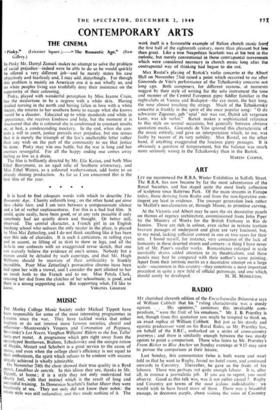MUSIC
Tim Morley College Music Society under Michael Tippctt have been responsible for some of the most interesting programmes in London since the war. They have tackled works that either frighten or do not interest more famous societies, choral and otherwise--Monteverde's Vespers and Coronation of Poppaea. Stravinsky's Les Noces, Vaughan Williams' Riders to the Sea. Tallis' forty-part motet. A programme which gets right away from the stereotyped Beethoven, Brahms, Tchaikovsky and the meagre ration of Haydn, Mozart and Schubert is a great service to the cause of music, and even when the college choir's efficiency is not equal to their enthusiasm, the spirit which refuses to be content with success already achieved is wholly admirable. On November 24th the choir showed their true quality in a Byrd motet, Laudibus de sanctis. In this idiom they are, thanks to Mr. Tippett, at home ; it is a style they hot only understand but clearly feel, with that instinct which is the result of long and successful training. In Domenico Scarlatti's Stabat Mater they were hopelessly at sea. They not only did not know their notes: the whole style was still unfamiliar. and they made nothing of it. The work itself is a favourable example of Italian church music front the first half of the eighteenth century, more than pleasant but less than great. Like a true Neapolitan Searlatti was at his best in the melodic, but merely conventional in those contrapuntal movements which were considered necessary in church music long after the contrapuntal way of thinking had begun to die out.
Max Rostal's playing of Bartok's violin concerto at the Albert Hall on November 23rd raised a point which occurred to me after Gioconda de Vito's performance of the Tchaikovsky concerto not long ago. Both composers, for different reasons, at moments suggest by their style of writing for the solo instrument the tone and manner of the Central European gipsy fiddler familiar in the night-clubs of Vienna and Budapest—the eye moist, the hair long, the nose almost touching the strings. Much of the Tchaikovsky concerto is frankly in the spirit of the once popular song: " 0 du schwarzcr Zigeuner, geh ' spiel ' mir was vor, Damit ich vergcssen kann, was ich verlor." Bartok makes a sophisticated reference to this style on several occasions, but generally between obvious quotation marks. Gioconda de Vito ignored this characteristic of the music entirely, and gave an interpretation which, to me. was faulty by reason of its very nobility. Max Rostal, on the other hand, if anything exaggerated the luscious gipsy passages. It is obviously a question of temperament, but the balance was much more seriously wrong in the Tchaikovsky than in the Bartok.
MARTIN COOPER.


































 Previous page
Previous page